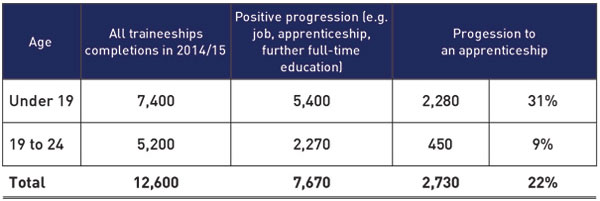The government has admitted that fewer than one in ten 19- to 24-year-olds who complete a traineeship course move on to start an apprenticeship.
Traineeships were launched three years ago, as part of the government’s drive to help low-skilled young people onto apprenticeships — but publicly available statistics only provide overall “positive” progression numbers to a job, apprenticeship, further full-time education or other training.
The government has repeatedly refused to answer questions about how many progressions there were from traineeships to apprenticeships — so it took a Freedom of Information request with the Skills Funding Agency to find out.
The figures showed that just 450 (nine per cent) of 5,200 completions for 19- to 24-year-olds in 2014/15 started an apprenticeship.
The figure was slightly higher for under-19s — with 2,280 (31 per cent) of 7,400 completions progressing — but it still meant that overall progression to apprenticeships stood at just 22 per cent.
This raises serious questions about the value for money the government is getting out of the programme, as it pushes for three million apprenticeship starts by 2020.

Richard Atkins was Association of Colleges (AoC) president when the body made traineeships reform one of its key general election manifesto pledges last year — stating they “should be converted into pre-apprenticeship training, specifically created to prepare 16- and 17-year-olds for a full apprenticeship”.
And after being presented with FE Week’s findings, Atkins, who was principal at Exeter College from January 2002 to March 2016, said: “I suggest that a review of traineeships is undertaken this year, so that more young people are able to fill the employer vacancies for apprentices.
“I believe it is critically important that a high quality pre-apprenticeship programme is developed in this country.
“Many young people are not employment-ready when they leave school or complete a level one programme at college.
“We need to equip these potential apprentices with the skills that employers want, especially the soft skills that will enable them to achieve selection by an appropriate employer. Traineeships should fill this gap.”
An AoC spokesperson told FE Week: “Our 2015 manifesto argued that the government should develop a strong pre-apprenticeship route and there is still a case for doing this.”
There were 19,400 traineeship starts in 2014/15, an increase of 86.3 per cent on the previous academic year, when concern was raised about the disappointingly low level of interest in the courses.
The Department for Business, Innovation and Skills declined to respond directly to Mr Atkins’ call for a review, but a spokesperson told FE Week: “We will continue to expand traineeships to create opportunities up and down the country so we can help as many young people as possible to get on.”
“There is no requirement for those completing a traineeship to take up an apprenticeship – a traineeship is designed to give school leavers and young people the skills to get on the career ladder. While for some a traineeship might be a step before an apprenticeship, it can also be a step in the right direction for other employment.”
Click here for Paul Offord’s editorial on this issue.








It’s interesting to see these figures. Under the Nuclear Industrial Partnership we have introduced Traineeships for 16-18 year olds to the nuclear sector for the first time and achieved a greater than 50% conversion rate in to Apprenticeships, with the remainder all going on to further education. These were bespoke courses designed in partnerships between employers and colleges with vocational training being provided through the employers themselves.
These Traineeships have proved to be of tremendous value to the employers involved and those that have gone on to Apprenticeships have shown themselves to be more dedicated and effective than those recruited through traditional methods. There is hope within the nuclear sector that Traineeships will be able to continue. Perhaps Traineeships won’t work across the board but can be successful in sectors where there is a clear employer buy-in and defined route on to Apprenticeships.
When considering progression routes from Traineeships, you also need to investigate the individuals motivations for taking up a place on a Traineeship programme. Typically the goal of an EFA funded 16-18 year old is to polish their skills enough to be able to secure an apprenticeship, however, despite the relatively small gap in age to a 19-24 learner, there is usually a set of circumstances that dictates an apprenticeship is not the preferred objective of an SFA learner. On our Traineeship programme we tend to find that the goal of a 19-24 learner is to secure FT work. Many of the 19+ individuals have circumstances that dictate they require a greater income than the minimum wage of an apprenticeship of £3.30 per hour (if they are in their first year) compared to £5.30 per hour national minimum wage for an 18-20 year old who is in employment. We always emphasize that either option is financially better than benefits, but, in most circumstances, money talks.